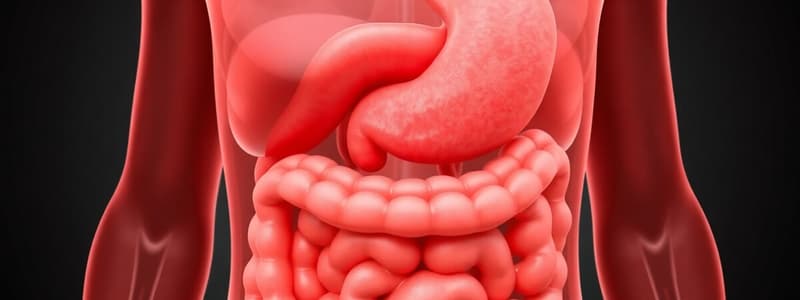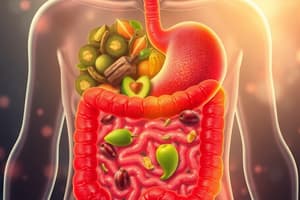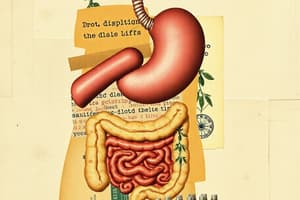Podcast
Questions and Answers
Which of the following best describes the role of amino acids in protein synthesis?
Which of the following best describes the role of amino acids in protein synthesis?
- They are broken down to release energy for cellular processes.
- They serve as substrates for the synthesis of nucleic acids.
- They are the building blocks that are assembled into proteins. (correct)
- They are only used for energy storage in muscle tissues.
What is the primary method of excreting waste products from cellular metabolism?
What is the primary method of excreting waste products from cellular metabolism?
- Nitrogen fixation in the kidneys.
- Reabsorption of minerals into the bloodstream.
- Release of oxygen during respiration.
- Feces elimination through the GI tract. (correct)
How does peristalsis contribute to the digestive process?
How does peristalsis contribute to the digestive process?
- It creates a conscious decision to start food ingestion.
- It prevents the absorption of nutrients in the intestinal walls.
- It rhythmically propels food through the gastrointestinal tract. (correct)
- It involves chemical reactions breaking down proteins into amino acids.
In the context of protein digestion, which process directly involves breaking down protein structures?
In the context of protein digestion, which process directly involves breaking down protein structures?
Which factor does not influence gene expression regulation?
Which factor does not influence gene expression regulation?
What primary substance in the stomach assists in breaking down food into chyme?
What primary substance in the stomach assists in breaking down food into chyme?
What is the name of the mixture formed in the stomach after food has been mixed with gastric secretions?
What is the name of the mixture formed in the stomach after food has been mixed with gastric secretions?
Which process follows the breakdown of food into molecules small enough for absorption?
Which process follows the breakdown of food into molecules small enough for absorption?
What is the final product formed from the compaction of solid waste in the large intestine?
What is the final product formed from the compaction of solid waste in the large intestine?
What role do amino acids play in the body after being absorbed from the digestive tract?
What role do amino acids play in the body after being absorbed from the digestive tract?
Which system is responsible for excreting cellular waste generated by metabolism?
Which system is responsible for excreting cellular waste generated by metabolism?
What primarily catalyzes the digestion of proteins in the stomach?
What primarily catalyzes the digestion of proteins in the stomach?
How are the large molecules of food broken down to allow for absorption?
How are the large molecules of food broken down to allow for absorption?
What is the main purpose of the protein digestion process in the gastrointestinal tract?
What is the main purpose of the protein digestion process in the gastrointestinal tract?
Which accessory organ is responsible for bile synthesis, aiding in fat digestion?
Which accessory organ is responsible for bile synthesis, aiding in fat digestion?
How do amino acids contribute to protein synthesis within the body?
How do amino acids contribute to protein synthesis within the body?
Which of the following processes is primarily regulated by gene expression during protein synthesis?
Which of the following processes is primarily regulated by gene expression during protein synthesis?
What can result from the denaturation of proteins during digestion?
What can result from the denaturation of proteins during digestion?
Which hormone is involved in stimulating the digestive processes within the stomach?
Which hormone is involved in stimulating the digestive processes within the stomach?
What is the main role of the pancreas in the context of protein digestion?
What is the main role of the pancreas in the context of protein digestion?
Which factor can influence the transit time of food through the gastrointestinal tract?
Which factor can influence the transit time of food through the gastrointestinal tract?
Flashcards are hidden until you start studying
Study Notes
Digestion Overview
- Digestion is a complex process that involves mechanical and chemical breakdown of food.
- The digestive system, also known as the gastrointestinal (GI) tract, processes food, beginning with ingestion and ending with waste excretion.
- The goal of digestion is to extract nutrients and calories from food.
- Food is broken down into smaller molecules for absorption into the bloodstream or lymphatic system.
- After absorption, nutrients are transported to cells and metabolized.
- Waste products, such as feces, urine, and carbon dioxide, are eliminated from the body through excretion.
The Digestive Process
- Food is chewed into a bolus and swallowed.
- The bolus travels through the esophagus to the stomach.
- Gastric acid (hydrochloric acid) and gastric secretions mix with the bolus in the stomach.
- Stomach muscles churn the bolus into chyme.
- Nutrients are absorbed from the small intestine and transported to cells.
- Waste is compacted in the large intestine by removing water, forming feces for excretion
Digestion Site Summary
- Mouth: Mechanical: Mastication. Chemical: Amylase
- Esophagus: Mechanical: Peristalsis
- Stomach: Mechanical: Mixing, churning. Chemical: HCl acid, Pepsin Gastrin
- Small Intestine: Mechanical: Peristalsis. Chemical: Amylase, protease, lipase, cholecystokinin, secretin. Absorption: Carbohydrates, proteins, fats, vitamins, minerals. Accessory Organs: Liver (bile synthesis), Gallbladder (bile storage), Pancreas (enzymes, sodium bicarbonate).
- Large Intestine: Mechanical: Peristalsis. Absorption: Water
- Rectum: Excretion: Feces
Excretion
- Feces is excreted as solid waste from the GI tract.
- Feces contains bacteria, fiber, sloughed intestinal cells, undigested food, and GI tract juices.
- Transit time, the time from ingestion to excretion, is typically 9 to 48 hours.
- Urinary output is the volume of urine excreted in 24 hours.
- Urine consists of water, nitrogen waste (urea), detoxified chemicals, mineral salts, and excess vitamins and minerals.
- Respiration involves excretion of carbon dioxide and water vapor as gaseous metabolic waste.
- Skin secretions, including sensible and insensible perspiration, release water, mineral salts, lipids, and amino acids.
Studying That Suits You
Use AI to generate personalized quizzes and flashcards to suit your learning preferences.




